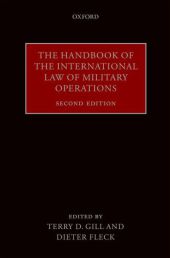 Neuerscheinungen 2015Stand: 2020-02-01 |
Schnellsuche
ISBN/Stichwort/Autor
|
Herderstraße 10
10625 Berlin
Tel.: 030 315 714 16
Fax 030 315 714 14
info@buchspektrum.de |

Dieter Fleck, Terry D. Gill
(Beteiligte)
The Handbook of the International Law of Military Operations
Herausgegeben von Gill, Terry D.; Fleck, Dieter
2. Aufl. 2015. 816 S. 236 mm
Verlag/Jahr: OXFORD UNIVERSITY PRESS; OUP OXFORD 2015
ISBN: 0-19-874462-5 (0198744625)
Neue ISBN: 978-0-19-874462-7 (9780198744627)
Preis und Lieferzeit: Bitte klicken
The second edition of this handbook offers authoritative commentary and analysis of the international law of military operations, encompassing self-defence, peace operations, and other uses of force, based on best-practice rules of global importance.
The second edition of this well received handbook provides a comprehensive overview and annotated commentary of those areas of international law most relevant to the planning and conduct of military operations. It covers a wide scope of military operations, ranging from operations conducted under UN Security Council mandate to (collective) self-defence and consensual and humanitarian operations and identifies the relevant legal bases and applicable legal regimes
governing the application of force and treatment of persons during such operations. It also devotes attention to the law governing the status of forces, military use of the sea and airspace and questions of international (criminal) responsibility for breaches of international law. New developments such
as cyber warfare and controversial aspects of law in relation to contemporary operations, such as targeted killing of specific individuals are discussed and analysed, alongside recent developments in more traditional types of operations, such as peacekeeping and naval operations.
The book is aimed at policy officials, commanders and their (military) legal advisors who are involved with the planning and conduct of any type of military operation and is intended to complement national and international policy and legal guidelines and assist in identifying and applying the law to ensure legitimacy and contribute to mission accomplishment. It likewise fulfils a need in pertinent international organizations, such as the UN, NATO, Regional Organizations, and NGOs. It also
serves as a comprehensive work of reference to academics and is suitable for courses at military staff colleges, academies and universities, which devote attention to one or more aspects of international law treated in the book. This mix of intended users is reflected in the contributors who include
senior (former) policy officials and (military) legal advisors, alongside academics engaged in teaching and research in these areas of international law.
Certainly, the breadth and depth of the perspectives the book provides on the military and the law will be a revelation to many of those conducting research - and forming opinions - on this and related topics. International lawyers, academics, policy makers and general readers as well, will find this book of immense value. Phillip Taylor MBE, Richmond Green Chambers


